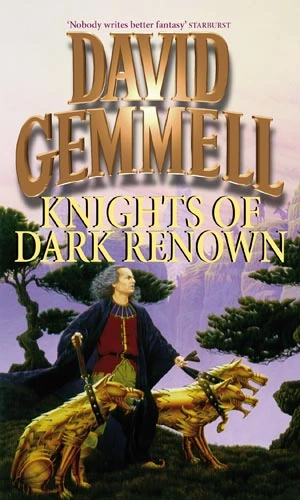 If you’ve been following this blog for any time at all, you know I’m a huge fan of David Gemmell. He’s not only my favorite fantasy writer, he’s my favorite writer, period. His first book, Legend, is still one of my favorite books of all time.
If you’ve been following this blog for any time at all, you know I’m a huge fan of David Gemmell. He’s not only my favorite fantasy writer, he’s my favorite writer, period. His first book, Legend, is still one of my favorite books of all time.
The Knights of Dark Renown is a true standalone, something rare in David Gemmell’s sizeable bibliography. And yet, page for page, it stands up to the best of his work. A brutally violent world populated with unlikely heroes and redeemed villains. An ancient order of magical knights fighting back against an even more ancient evil. Characters who leap right off the page and grab you by the heartstrings, making you weep when they die and stand up and cheer when they triumph—sometimes with the very same breath.
Honestly, if I’d written this review right after I read the book, it would be nothing but “squee!” repeated over and over. It’s been a few months, so my excitement has definitely been tempered with the passage of time, and yet looking back I can definitely say that this was an excellent book.
It’s probably the best vampire novel I’ve ever read, which isn’t what I was expecting. There are a million different kinds of vampires out there, most of which I have no interest in, but these vampires strike much closer to the original: charming, blue-blooded monsters who look perfectly normal on the outside, but beneath the facade are as cruel and terrifying as the most competent and accomplished serial killers—which they very often are. But the really awesome part is how the vampires tempt those they deem worthy to join them, which is how they begin the conquest of the world of men. Without ruining the book, I’ll just say that I was impressed.
Gemmell is often accused of writing the same book over and over again. While that isn’t completely fair, I do see how he gets that reputation. Thing is, that book he supposedly keeps rewriting is a damn good one. He’s a lot like Louis L’Amour in that way.
However, Knights of Dark Renown is something of a departure from that vein. The magic system is different from his other books, as is the lore. The usual character archetypes are there, though he combines them in different ways. The bard, for example, follows a very different path from the Drenai books, and is cut from a different cloth. But none of it is a particularly great departure from Gemmell’s usual fare.
With all that said, I really enjoyed this book. It easily earned the five stars I gave it. Highly recommended.